We're holding power up to the light to see just how it works—its neuropsychology, its femininity, and even what it wears to Paris. Come along for an authentically O power trip.
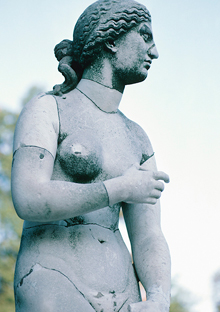 The Final Frontier
The Final FrontierWomen and power: Is there a more incendiary combination of words in the English language? Drinking and driving? Teenagers and sex? A woman can never be too rich or too thin, but until very, very recently, she could be too powerful, for which—if she wasn't smart enough to camouflage herself—she generally paid the price. Sometimes she got burned at the stake. Sometimes she got run out of town. Sometimes she simply got sexualized, which has been the easiest way to neutralize, if not destroy, an accomplished woman.
Of course, women have long exercised influence behind the scenes. A few thousand years ago this drove Aristotle to distraction: "What difference does it make whether women rule or the rulers are ruled by women? The result is the same." Especially on the domestic front, women are acknowledged to be experts at a tensile brand of quiet authority: The old adage has it that an American woman rises to a crisis, but that a Frenchwoman sees to it that a crisis never arises. And no one with a mother can deny that she wields—without lifting a finger and by virtue of her sheer existence—an outsize, open-ended, irrevocable influence on a life.
For the most part, though, history acknowledges a different, more disarming brand of power: a woman's ability to unmake a man. In a first-century B.C. marriage contract, a bride promised to be faithful and affectionate. She also vowed not to add love potions to her husband's food or drink. For the several thousands of years before they became firefighters and physicians, women were sirens, enchantresses, snares. At times it seems as if female powerlessness is male self-preservation in disguise. And for millennia, this has made for a zero-sum game: A woman's intelligence was a man's deception.
The accepted wisdom is that women have made the longest strides toward independence, toward authority and opportunity, in periods of great dislocation. If that is so, we must be living in the most fractured, befuddled, out-of-joint age ever, as we live—for the first time—in a world of female taxi drivers and Supreme Court justices, fighter pilots and four-star generals. For the second time we have a woman in the White House who might just as well have landed there on her own. We even live in an age when what have traditionally been considered female traits—strong communication skills, a collaborative instinct, a gift for juggling, emotional intelligence—are hailed as desirable leadership qualities. For a few thousand years women had no history. Marriage was our calling, and meekness our virtue. Over the last century, in stuttering succession, we have gained a voice, a vote, a room, a playing field of our own. Decorously or defiantly, we now approach what surely qualifies as the final frontier.
Which raises a question of the hour. Is it possible for a woman to wield power without reference to her gender? Can she prove herself competent, effective, articulate without being dismissed as either a bitch or a bimbo, until recently her only career choices? Power has for so long been a male construct that it distorted the shape of the first women who tried it on, only to find themselves in a sort of straitjacket. Powerful women were caricatures of their male colleagues. They had no feelings. They didn't like to talk about shoes. No wonder early feminists hoped the concept of power would vanish entirely when women ran the world.
Instead it seems that women have begun to transform, to broaden and deepen, the whole idea of power. A woman no longer has to leave off being a woman to embrace it. (Ego trips are not a male preserve.) Nor does anyone have to sit in the vicinity of a corner office; power has many addresses. One can wield it without a suit and tie, just as one can do so without a paycheck, a portfolio, a job. Having been for so many years defined by our bodies, we have no particular desire to be defined by our business cards.
Across the board, we're separating success from purpose, focusing less on title, career, status, more on accomplishment, influence, responsibility to ourselves and to our world. Those are not only equal-opportunity employers but also self-employers. They're bestowed from the bottom up rather than from the top down. They can't be forcibly removed. As the feminist scholar Carolyn Heilbrun defined it, "Power is the ability to take one's place in whatever discourse is essential to action and the right to have one's part matter." That is no less true on the playground than at the Pentagon. At issue are self-mastery and self-esteem rather than title and totem pole; we're overhauling the very concepts of influence, leadership, clout, control. There may be no single better definition of power.
— Stacy Schiff (Find out where Stacy discovers power in her own life)

Photo: © 2009 Jupiterimages Corporation
In 2001 Pepperdine University professor of marketing Roy D. Adler, PhD, made a startling discovery: In a study tracking the profitability of more than 200 Fortune 500 companies over 19 years, Adler found that the 25 firms that most aggressively promoted women to executive positions had 34 percent higher profits as a share of revenue than the industry median. What's more, the ten firms with excellent records of promoting women—including Google, Apple, and Johnson & Johnson—posted much higher profits than even the firms whose records were merely very good. These results have been confirmed in studies for the past five years running—proof that women leaders make good dollars and sense.
— Katie Arnold-Ratliff
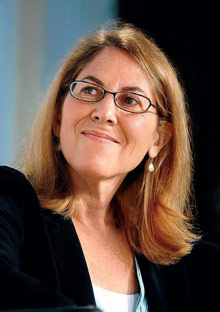
Photo: Courtesy of the Omega Institute
When it comes to nurturing, you may think mothers have the market cornered. But as Elizabeth Lesser, cofounder of the wellness- and spirituality-focused Omega Institute, knows, anyone with a beating heart can cultivate it.
I'm sitting in a café in Sausalito, a continent away from my home in New York, wondering if all the relaxed California folks can hear the blaring sirens of my thoughts: "Did I remember to tell so-and-so about such and such at work? Did I pay the Visa bill? Can I still do that conference call tomorrow, and finish the blah-blah-blah by the end of the week?"
And what powerful wave has washed me up on this shore? What tsunami had the strength to tear me away from my workaday compulsions? Mother love. I've crossed the country to await the birth of my first grandchild.
Aside from gravity, I don't know if there's a force as strong as the pull to care for one's children—even if those children are all grown up. The social observer Harriet Rubin has come up with a word for this force: mamisma, "femininity defined by mature and maternal qualities." But one need not be a mother, or even a woman, to be motivated by mamisma. It's available to anyone who values the power of the heart.
Mamisma is not to be confused with machisma, which is the sister of machismo. The world does not need patriarchy to be replaced by matriarchy. It needs mamisma. It needs women to harness their hearts and drive the chariots of love into the center of town. It needs men to choose empathy over aggression. It needs each of us—and especially the most powerful among us—to put away the drive for ego power and take up the banner of protection, inclusion, and care. I have hope about this. Over the decades, I've seen mamisma gaining strength. I've seen it in my husband, a jock from West Texas who harnessed mamisma when he became a single father to his 5-year-old son; I've seen it in business leaders who are beginning to include the needs of their people in the bottom line; I've seen it in young women who want to redefine power itself, to change the rules and the priorities and bring the totality of their intelligence into their work and their relationships and families. And now I'm seeing it in my son, poised to use the power of love to pave a boulevard of opportunity and joy for his own baby.
So here I sit, in a strange café, gripping my cell phone, awaiting a call. If anyone asks, I'll say mamisma made me do it.
— Elizabeth Lesser (Find out where Elizabeth discovers power in her own life)
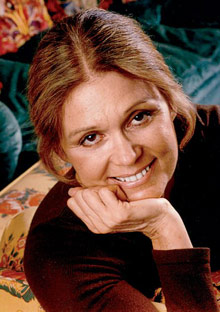
Photo: Courtesy of Gloria Steinem
A river of Truth
Ends at a dam of bias—
Truth floods and moves on.
— Gloria Steinem (Find out how Gloria discovers power in her own life)
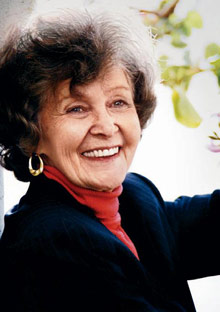
Photo: Courtesy of the Omega Institute
We've invented the wheel, cracked the code of DNA—so what's next for humankind? Marion Woodman, a pioneering Jungian analyst and the author of ten books, believes that individuals and societies were meant to grow. And our best chance for growth, she thinks, is to bring the feminine into our culture. The following is taken from an interview O conducted with Woodman:
When I say the feminine, I don't mean gender. I mean the feminine principle that is living—or suppressed—in both men and women. The feminine principle attempts to relate. Instead of breaking things off into parts, it says, Where are we alike? How can we connect? Where is the love? Can you listen to me? Can you really hear what I am saying? Can you see me? Do you care whether you see me or not?
Now, these are very serious questions. And the feminine is difficult to talk about because so few people have experienced it. The feminine is presence, and relatedness, and a heart that can open so that when you meet another person you actually are seeing that person's authentic self. What meaning does human life have if nobody has ever seen you?
I can't tell you the number of people—men and women—who have sat in my office sobbing, saying, "Nobody ever saw me. Nobody ever had time to listen. So I am unlovable"—the saddest word in the language. Sometimes I've had a real flood of feeling about somebody, and I put out my hand and they say, "Don't touch me. I'm unlovable." And they mean it. As a child, that person was raised where the feminine was not present. You have to experience the feminine to understand it.
Ask yourself: As a child, who saw you? Who heard you? Was there anyone with whom you could be totally yourself and to whom you could trust your heart responses and speak your soul responses? Someone who made you think, "Gosh, I am somebody. They're happy that I'm here."
The great work of our time is to bring the feminine into this culture. And it's not an easy path. How does each one of us contribute? Believe it or not, it's done in the most personal ways. Take time to listen to your dreams, to write them down. Take time to recognize that there are things going on within you that need to be felt, or said, or lived, or grieved. Pay attention to these things both in yourself and in the people in your life. Pay attention to the authentic self.
Now, about that word authentic. It is related to the word author—and you can think of it as being the author of your own self. When you're living your own reality, you become the sovereign of your own life. You know who you are, you speak what you believe. There's a natural pride that goes with that: This is who I am—take me or leave me. Think of Michelle Obama—she is not afraid of her own strength. And since her strength takes nothing away from anyone else—because it is given with love—she is free to be her authentic self.
To me, real power is about presence. It's the energy of knowing that you are who you are, and therefore speaking and acting from your authentic self. It doesn't matter what your work is—if you're a teacher or a nurse or whatever; it is your presence that's the power. It's not power over anybody else. It's just the expression of who you are.
Power in the sense of controlling somebody else is different from personal presence. That kind of power—patriarchal power—does not value other people. What I strive for instead is empowerment.
Love is the real power. It's the energy that cherishes. The more you work with that energy, the more you will see how people respond naturally to it, and the more you will want to use it. It brings out your creativity, and helps everyone around you flower. Your children, the people you work with—everyone blooms.
— Marion Woodman (Find out how Marion discovers power in her own life)
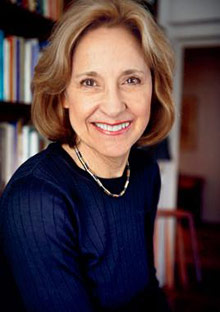
Photo: Diane Vasel
Have you ever intuited that the way women think can actually change the world? Biological anthropologist Helen Fisher would say that you're absolutely right:
Men and women are like two feet; they can help each other get ahead. And, in part, this is because they have different ways of thinking. Women, on average, collect more bits of data, assemble that data into more complex patterns, and weigh more options as they make decisions. Women tend to see the big picture; they generalize and synthesize as they consider webs of factors—what I call "web thinking." Men, on the other hand, get to the point. Typically, they are more likely to focus on what they consider relevant, then ponder in a more linear progression: "step thinking." Both approaches have merit. Each has been traced, respectively, to the hormones estrogen and testosterone. And each evolved millions of years ago as women did more multitasking to rear the young, while men spent more time zeroing in on one thing at a time—often hunting game.
Web thinking has its payoffs—among them women's intuition, imagination, and natural aptitude for long-term planning and networking. No wonder we're headed for a powerful role in the world.
Why? Because the world is coming around to our way of thinking. Communication itself has taken a weblike turn as social networking and collaborative enterprises like Wikipedia become part of our daily lives. Business has also begun to favor women's strong suits. Globalization requires taking a broad contextual and long-term view. And with our growing concern over healthcare, poverty, and the state of the planet, creative thinking is currently in high demand.
Women, it turns out, are built to lead—particularly in the modern world.
— Helen Fisher
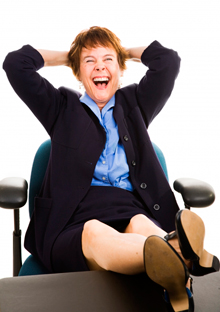
Photo: © 2009 Jupiterimages Corporation
In the 1980s, before she started studying the nature of power, psychologist Deborah Gruenfeld, PhD, did public relations for magazines. There was one editor whose sense of entitlement she'll never forget: "He had a refrigerator by his desk with only two things in it—cut raw onions and a bottle of vodka. And while we were meeting he'd lean over and take a drink of the vodka and eat the onions. He never offered to share, and nobody ever questioned it."
Now a professor of leadership and organizational behavior at the Graduate School of Business at Stanford, Gruenfeld says the man's behavior was a perfect example of what some studies have shown—that people in positions of power are more likely to focus on their own needs and goals while disregarding what others are experiencing. (In one experiment, the empowered people ate the extra cookie from a plate, chewed with their mouths open, and scattered crumbs.) Having authority, Gruenfeld and her colleagues have found, tends to make you favor people who are useful to you, regardless of whether they're likeable; it also inflates the sense that you can influence random events, such as rolling a die. And it makes you less inhibited socially and sexually.
In other experiments, Cameron Anderson, PhD, an associate professor of organizational behavior and industrial relations at UC Berkeley, discovered that power made people positively overestimate how others viewed them. And Gerben van Kleef, PhD, an associate professor of social psychology at the University of Amsterdam, found that high-powered people were less compassionate. Interestingly, researchers say their findings apply to both sexes.
"Power definitely transforms the way you approach the world," says Adam Galinsky, PhD, a professor of management and organizations at Northwestern University's Kellogg School of Management and one of Gruenfeld's collaborators. And that transformation can be a good thing: The traits power enhances—being goal-oriented, self-interested, and comfortable taking risks—are potent leadership qualities when wielded responsibly. "The trick," says Galinsky, "is to harness power without letting it harness you."
— Jonathan Vatner
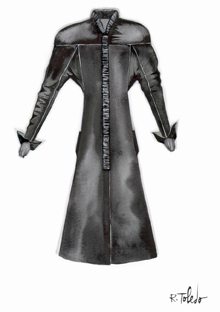
If anyone understands how clothes can transform us, it's Valerie Steele, director and chief curator of the Museum at the Fashion Institute of Technology in New York City. We asked her about what makes a woman feel commanding:
The item of clothing that makes us feel powerful is the one that makes us feel confident and self-assured, that magically makes us look our best in all kinds of circumstances. Whenever I have to give an important talk or go to Paris to see the collections and I have to travel with a small bag, I keep pulling out this one black taffeta coat by Isabel Toledo. I bought it about eight years ago, thinking, "I hope I'm not spending too much." But it turns out it's incredibly versatile: I can wear it over a load of sweaters, or with just a blouse. It falls below the knee, and it's got a very shapely silhouette, but it's still streamlined and crisp. Very flattering. It makes me look tall and slim. And though it isn't couture, it looks like it is. The sleeves are beautiful, the back delicately cut. Yet it's also a real workhorse, practically indestructible. I can spill the sugar off a doughnut on it; it wipes clean. It can get rained on; it hangs dry. It folds into nothing. I can wear it day or night, over jeans and a T-shirt or over a fancy dress with heels. If I had to run out of my house with only one thing and my cat, this coat is the thing I'd be tempted to grab.
— Valerie Steele
Meet the 20 remarkable women on O's first-ever Power List
Photo: Sheva Fruitman




